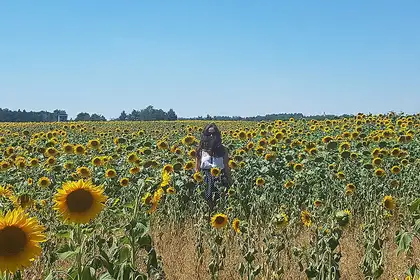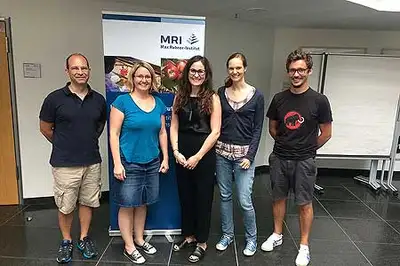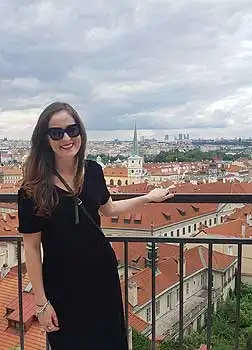
PhD student Nikki Renall visits a sunflower field in Salzburg, Austria, after her six-week stay in Germany, working at the Max Rubner-Institut.
Nutritional Sciences PhD student Nikki Renall has recently returned from Germany, where she spent six weeks at the Max Rubner-Institut (MRI) in Karlsruhe, approximately 150 kilometres south of Frankfurt.
The collaboration came about via Massey chair in Human Nutrition, Professor Bernhard Breier’s relationship with the world-renowned research facility, which focuses on consumer health protection in the nutrition sector. Ms Renall received a PhD fellowship and travel support from the Riddet Institute Centre of Research Excellence.
Ms Renall, who is also a New Zealand registered dietitian, is focusing on the relationship between the diet and gut microbiome. She was recommended by Professor Breier so she could learn how to analyse habitual dietary intake from the PROMISE (PRedictors linking Obesity and gut MIcrobiomE) study. The study, funded by the Health Research Council of New Zealand, aims to understand how diet, physical activity, sleep and taste affect the gut bacteria of New Zealand's European and Pacific women and how this may be linked to long-term health and a healthy body weight.
“We don’t know enough about the relationship between the gut microbiome, diet and health outcomes but we are trying to shed some light on it from a New Zealand perspective,” Ms Renall says. “We know in New Zealand, one in three adults are obese, and that number is rising. I am trying to see if there are any dietary behaviours or habits which we can link to the gut microbiome."
Ms Renall says the experience at MRI taught her a novel way to analyse habitual dietary data, which is to her knowledge not currently done in New Zealand. “To learn that and bring it back here to work on in a New Zealand setting and population is really exciting, as this method is being used around the world.
“Without going to Germany, we wouldn't have been able to generate such rich data from the PROMISE study, which I am currently in the process of exploring, to see if there are any health behaviour associations with the way people are eating, what they are eating and the microbiome,” she says.

From left: Klaus Schmidt, Dr Daniela Graf, Nikki Renall, Dr Ann Katrin Engelbert and Dr Benedikt Merz.
Helping make the healthy choice, the easy choice
The 30-year-old, whose iwi is Taranaki, grew up in Waiuku in South Auckland. She wants to make the healthy choice, the easy choice. “I would love to be working for somewhere like the Ministry of Health, guiding public policy. I think healthy eating should be easy for everyone. Knowledge is power, and if people understand more about the impact of their dietary choice, and society supports them to make healthier choices, it could hopefully help prevent poor metabolic health outcomes.”
Given that New Zealand sits third in the OECD for obesity, Ms Renall wants more focus on prevention. “Nutrition and lifestyle is a massive part of that. When you eat well, you feel good and a varied diet has been linked to a diverse microbiome which has been associated with better health outcomes, but we have yet to figure out exactly how the diet is related to the gut microbiome. I would just like to help make a difference for people - make health more equal for everyone.”

Nikki Renall visits Vienna, Austria.
Getting a taste of Europe
Ms Renall, who now lives in Birkdale on Auckland’s North Shore, relished her time in Germany, before taking a three-week holiday around The Netherlands, Austria, Prague and Germany, including Munich and Berlin, with her fiancé.
“Every day we would just reflect, ‘Wow, we’re in a different country’, it was the smallest things that were the most enjoyable - driving our campervan on the other side of the road, visiting little towns, shops, cafés, not speaking any of the language, but people were so friendly and welcoming. And the food, especially the healthier options were a lot cheaper than New Zealand. I loved perusing the supermarkets, and the cheese, so cheap and so good!”
She says the trip taught her a lot about herself and the way we do things in New Zealand.
“I found the whole experience amazing. I love the way they prioritise recycling even in public places, and how everyone bikes to work. It was like something out of a movie - you see ladies in dresses and men in suits biking along - the incidental activity they engage in, and the lifestyle. I just really really liked that.
“I feel like I’ve made friendships for life with some of the colleagues I worked with over there, and I continue to work with. The relationships and the collaboration will be a platform for me in the future, because they are wonderful and so supportive and we are all in it for the right reasons. Spending time at the MRI actually reinvigorated my love for science. It was just wonderful to talk to people across the world that are leading experts in their field and we share common ideals about creating good science and I guess I'm a bit of a geek like that.”
Ms Renall was supervised by Dr Benedikt Merz while at the MRI. Her supervisor at Massey University is Professor Breier, from the School of Sport, Exercise and Nutrition.